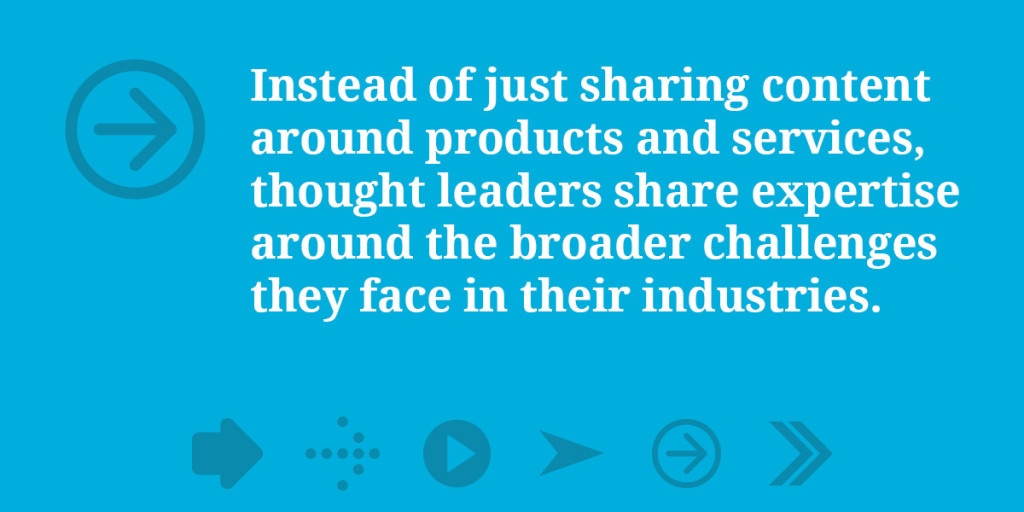Thoughts on Thought Leadership – Why You Need to Establish Yourself as a Thought Leader
One of the best approaches for building a reputation and generating business leads is thought leadership. Becoming a thought leader requires ongoing commitment and has a high impact for your business when combined with other elements of the public relations and marketing mix.
Definition of a Thought Leader

In business school, we learn the marketing adage: “Above all else, be memorable.” Thought leaders are top of mind in this respect. These individuals and organizations take content to the next level by serving as their industry spokespersons, taking a stand on issues or giving away a little of their intellectual property to establish their usefulness.
Instead of just sharing content around products and services, thought leaders share expertise around the broader challenges they face in their industries.

They are conveners of best practices, sponsors of original research and the speakers and writers quoted by others. Thought leadership is simply about becoming an authority on relevant topics by delivering answers to the biggest questions on the minds of your target audience.
While it can include your unique perspective on hot topics relevant for your customers, the key is that the agenda is set by your audience. They determine what the questions are. You simply need to answer them. So your level of authority is really determined by how well you answer those crucial questions.
Why Becoming a Thought Leader Is Important
Bottom line, proprietary content builds a reputation for thought leaders and their companies. This reputation can be leveraged to generate and nurture leads, build trust, turn your audience into advocates and open more opportunities than only closing a sale.
Becoming a thought leader begins with and ultimately benefits you or your organization by:
- Starting Conversations
Sharing knowledge on hot topics in an industry invites followers to share their challenges, solutions or similar situations, giving thought leaders a channel to form relationships with their readers. - Building Credibility
When thought leaders enhance their advice with personal experience, they build credibility as professionals and as spokespersons for their companies. - Differentiating an Organization
Many organizations rely on traditional marketing as their primary means of promotion. This year, however, we’ll see content marketing take a front seat to advertising, setting companies who practice it ahead of their competitors. Thought leaders who offer insightful advice into relatable challenges in their industry outperform novice marketers who just scratch the surface. - Engaging Audiences Instead of Selling

Audiences don’t want to be sold to; they want to be informed, taught, inspired and entertained.
According to the National Center for Biotechnology Information, at the U.S. National Library of Medicine, our average attention span is now eight seconds – one second less than a goldfish. Because consumers’ attention spans are shorter, they are less likely to endure uninteresting topics.
However, they actively seek information that interests them, giving professionals an opening to provide that information. When thought leaders produce worthy content, they feed into consumers’ desire to be informed, taught, inspired or entertained.
- Increasing Search-ability and Spread-ability
Search-ability is defined as the extent to which content can be searched, whereas the spread-ability is the ease of, or the extent to which, the content is being shared.When a thought leader produces quality content, he or she increases the search-ability and spread-ability of that content topic, the company and the thought leader as a professional.
- Keeping Professionals and Their Businesses Top of Mind
When a thought leader’s company consistently puts out quality material, while their competitor stays quiet or produces inferior content, customers think of the thought leader’s company first when making a business decision.
Questions to Consider Before Pursuing a Thought Leader Path
While the thought leader position can be enticing, this strategy isn’t necessarily correct for everyone or for every organization. Before pursing the thought leadership path answer the following questions. If you’ve answered all of them with an emphatic yes, then you’ll be ready to proceed to the next steps toward becoming a thought leader in your field.
- Do you have something insightful to say?
- Will you invest time in developing your voice?
- Are you committed to the process?
- Do you have resources to be pervasive in multiple channels and formats?
- Are you opinionated?
- Are you available and persistent?
Learn more about thought leadership next week when we cover “How to Drive Results as a Thought Leader.”
About the Author
Joel Swanson, President, Risdall Public Relations

Joel leads the public relations agency within Risdall, currently the sixth largest public relations agency in Minnesota, helping brands, products and thought leaders establish reputations in their unique marketplaces. He leads a group of nine public relations strategic experts, with insights and expertise in five complex industries: financial services, health care, manufacturing, education, and government programs, and with cross functional teams that include a dozen integrated staff. Under his leadership, Risdall serves local and national clients such as Affinity Plus Credit Union, Allina Health System, Baxter Worldwide, Healthways, Help Me Grow, LifeScience Alley, Metropolitan State University, Northeast Bank, OptumHealth Financial, and the Star Tribune. Risdall PR has earned numerous industry awards, most recently four 2015 PRSA Classics Awards, and currently a finalist for the national Silver Anvils awards.
Prior to joining Risdall, Joel led strategic public relations for several growth areas of Blue Cross and Blue Shield of Minnesota, including the advent of consumer-directed health plans, disease management, the acclaimed “do” campaign and more. He previously led internal communications and media relations for Bethel University and coordinated the Minnesota Teacher of the Year Program and other outreach for Education Minnesota. Joel currently serves as President of the Minnesota Chapter of the Public Relations Society of America, and serves on the Board of Directors for Clearway Minnesota. Joel holds a bachelor’s degree in both Mass Communication and Business Management from St. Cloud State University, as well as a master’s degree in philosophy and theology from Bethel University.
Sources: http://www.statisticbrain.com/attention-span-statistics/